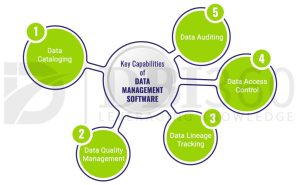In today’s data-driven world, businesses increasingly rely on their data assets to make informed decisions, drive growth, and maintain a competitive edge. However, with data’s ever-increasing volume and complexity, managing and governing it effectively has become a critical challenge, especially in the B2B realm. This is where data management software (DMS) plays a pivotal role.
Data management solutions provide comprehensive tools and capabilities to help organizations manage and govern their data effectively. These tools encompass data quality management, lineage tracking, access control, and auditing. All of these contribute to ensuring data integrity, compliance, and reliability.
The Significance of Data Governance in B2B Operations
Data governance has emerged as a critical aspect of B2B operations, enabling businesses to:
-
Enhance data quality: Data management system helps organizations ensure the accuracy, consistency, and completeness of their data, reducing errors and improving decision-making.
-
Maintain regulatory compliance: With increasing data privacy regulations, data governance ensures compliance with industry standards and protects sensitive customer information.
-
Empower data-driven decision-making: By ensuring data quality and compliance, data governance provides businesses with a reliable foundation for making informed decisions that drive growth and innovation.
-
Foster collaboration and transparency: Data governance promotes collaboration and openness among departments, ensuring that everyone uses the same data and follows the same standards.
DMS – A Cornerstone of Data Governance
Data management solution software is crucial in achieving effective data governance by providing a centralized platform for managing and governing data across the organization.
Key capabilities of the data management system include:
-
Data cataloging: Data catalogs offer a comprehensive inventory of data assets. It enables users to quickly discover, understand easily, and access relevant datasets.
-
Data quality management: Data quality tools identify and correct data errors. Ensuring the accuracy and reliability of data for analysis and decision-making.
-
Data lineage tracking: Data lineage tracks the origin and transformation of data. It provides insights into how data has been used and ensures data integrity throughout its lifecycle.
-
Data access control: Data access controls restrict access to sensitive data based on user roles and permissions. A preventive measure to unauthorized access and data breaches.
-
Data auditing: Data auditing logs all data access and modification activities. It provides a trail of evidence for regulatory compliance and incident investigation.

Effective Data Governance with Data Management Solution
To successfully implement data management software and achieve effective data governance, organizations should consider the following steps:
-
Define data governance goals: Clearly define the purposes of the data governance initiative, ensuring alignment with overall business objectives.
-
Establish data governance policies: Develop clear and comprehensive policies outlining data ownership, access, and usage standards.
-
Choose the right data management solution: Select a solution that aligns with the organization’s needs, data volume, and budget.
-
Implement data management processes: Integrate data management processes into existing workflows, ensuring seamless adoption and utilization of the software.
-
Train and educate employees: Provide comprehensive training and education on the importance of data governance and the proper use of data management software.
Conclusion
Data management software has become indispensable for B2B organizations seeking to establish effective data governance practices. By ensuring data quality, compliance, and informed decision-making, the data management system empowers businesses to harness the full potential of their data assets. They are leading these businesses to drive growth and success in today’s competitive landscape.

